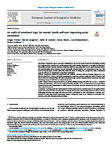An audit of emotional logic for mental health self-care improving social connection
| dc.contributor.author | Turton, A | |
| dc.contributor.author | Langsford, M | |
| dc.contributor.author | Di Lorenzo, D | |
| dc.contributor.author | Zahra, Daniel | |
| dc.contributor.author | Henshelwood, J | |
| dc.contributor.author | Griffiths, T | |
| dc.date.accessioned | 2021-09-17T13:12:11Z | |
| dc.date.available | 2021-09-17T13:12:11Z | |
| dc.date.issued | 2020-08 | |
| dc.identifier.issn | 1876-3820 | |
| dc.identifier.issn | 1876-3839 | |
| dc.identifier.other | 101167 | |
| dc.identifier.uri | http://hdl.handle.net/10026.1/17833 | |
| dc.description.abstract |
Introduction: Emotional Logic is a practical contribution to self-care for mental health and adaptability, teaching how unpleasant loss emotions have useful purposes that enable healthy adjustments to changing circumstances. Measurable personal capacity outcomes result from SMART action plans that recover named personal values. New understanding about emotions cascades informally through families and communities at low cost. This proof of concept paper presents audits that define the theory of change for a prospective study of Emotional Logic for self-care in compassionate networked communities. Methods: Comparative audits of mental health and resilience outcomes with two learning cohorts were conducted using GAD-7, PHQ-9, and ELDP questionnaires. Long-term outcome audits also asked if learners’ had shared their new understanding with others. Emotional Logic coaches categorised ELDP statements into those identifying change of individual or relational capacities. Results: Cohen's d shows improved resilience on guided self-help learning with effect size 1.13 (p < 0.001) for anxiety and depression, and 0.91 for youth personality disorder. 31 % of improvement for mental illness measured by the ELDP is hypothesised to follow improved relational capacities measured by 13/34 (38 %) of its Likert scaled statements. Conclusions: Teaching people the useful purposes of their unpleasant loss emotions improves the quality of their social connections and their mental health. Developing this personal understanding empowers self-care in new challenging situations that might otherwise have led to professional or other dependencies. Outcomes measurement of truly values-based action plans enables a prospective study to be conducted in networked communities, achievable through social prescribing. | |
| dc.format.extent | 101167-101167 | |
| dc.language | en | |
| dc.language.iso | en | |
| dc.publisher | Elsevier | |
| dc.subject | Emotional intelligence | |
| dc.subject | Emotional logic | |
| dc.subject | Resilience | |
| dc.subject | Adaptability | |
| dc.subject | Mental illness | |
| dc.subject | Health promotion | |
| dc.subject | Self-care | |
| dc.title | An audit of emotional logic for mental health self-care improving social connection | |
| dc.type | journal-article | |
| dc.type | Journal Article | |
| plymouth.author-url | https://www.webofscience.com/api/gateway?GWVersion=2&SrcApp=PARTNER_APP&SrcAuth=LinksAMR&KeyUT=WOS:000568719700008&DestLinkType=FullRecord&DestApp=ALL_WOS&UsrCustomerID=11bb513d99f797142bcfeffcc58ea008 | |
| plymouth.volume | 37 | |
| plymouth.publication-status | Published | |
| plymouth.journal | European Journal of Integrative Medicine | |
| dc.identifier.doi | 10.1016/j.eujim.2020.101167 | |
| plymouth.organisational-group | /Plymouth | |
| plymouth.organisational-group | /Plymouth/Faculty of Health | |
| plymouth.organisational-group | /Plymouth/Research Groups | |
| plymouth.organisational-group | /Plymouth/Research Groups/Plymouth Institute of Health and Care Research (PIHR) | |
| plymouth.organisational-group | /Plymouth/Users by role | |
| plymouth.organisational-group | /Plymouth/Users by role/Academics | |
| dcterms.dateAccepted | 2020-06-24 | |
| dc.rights.embargodate | 2021-9-18 | |
| dc.identifier.eissn | 1876-3839 | |
| dc.rights.embargoperiod | Not known | |
| rioxxterms.versionofrecord | 10.1016/j.eujim.2020.101167 | |
| rioxxterms.licenseref.uri | http://www.rioxx.net/licenses/all-rights-reserved | |
| rioxxterms.licenseref.startdate | 2020-08 | |
| rioxxterms.type | Journal Article/Review |


